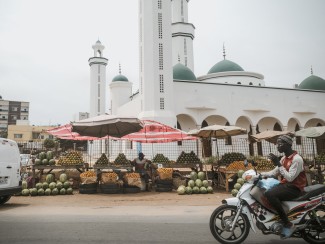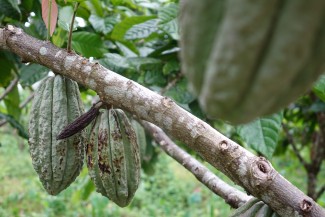What do a mountainous landlocked country, a post-war African nation, and three small island developing states have in common?
All are asking themselves how best they can capitalize on the etrade boom that is fundamentally changing the way the world does business.
Nepal, Liberia, Samoa, Vanuatu, and the Solomon Islands have recently had their readiness and willingness to embrace etrade analysed by the UN Conference on Trade and Development (UNCTAD) — with support from the Enhanced Integrated Framework (EIF) — as part of the eTrade for all initiative.
“Countries approach us saying: ‘we see etrade as a potential for export diversification but we don’t know where to start – what product, what market we can target?’” says Sven Callebaut, trade advisor who has been leading UNCTAD’s rapid e-Trade Readiness Assessments service offering. Ten countries have been assessed so far, with most of them classified as Least Developed Countries (LDCs).
Etrade is any business transaction that is conducted online — from buying books on Amazon to sending remittances to family in another country. It has the potential to challenge the model of export-led growth by enabling both individual consumers and firms to shop for the best deal globally, thus lowering prices and increasing quality of imports. But according to Callebaut, we’re far off realizing that future.
“Ninety percent of the countries we analysed only engage in domestic etrade because they don’t have a mechanism to export cross border for ecommerce. In developed economies it’s the other way around: most etrade is happening across borders,” Callebaut says.
The assessments are unique in that: they are instigated by the country governments (usually the Ministry of Trade or Commerce) and they are rapid (they only take three to four months). Additionally, they make specific recommendations in seven key policy areas, or as Callebaut puts it: “everything you need to have ready in your ecosystem for etrade to happen,” namely:
- ecommerce readiness and strategy formulation
- ICT infrastructure and services
- trade logistics and trade facilitation
- payment and mobile money solutions
- legal and regulatory frameworks
- ecommerce skills development
- access to financing
Related: Infographic - Vanuatu eTrade Readiness Assessment
'WHY DO YOU NEED US?'
One of the first steps in the assessment is to understand the reason for the request, says Callebaut. “We ask countries: ‘why do you need us, why do you need an etrade readiness assessment and what do you need etrade for?’”
The response, he says, falls broadly into four areas.
“For some countries, there is a national vision to become a digital economy and they want to etrade to be part of that. Others don’t know how to define negotiating positions on etrade and how to train private and public-sector officials on how to benefit from etrade.”
“The third aspect is a drive to diversify foreign trade. Finally — and this is mostly happening in the Pacific — ICT infrastructure is rapidly developing, and countries want to make the most of these developments.”
Once the fact-finding stage is over, an online survey is sent to the major country stakeholders, the findings of which inform a series of focus groups and bilateral meetings, normally run by an international consultant, collaborating with and mentoring a national consultant. During these conversations, many case studies are uncovered that illustrate both how etrade is already taking place in the country and the main barriers to its progress.
Then comes the final task of drafting and validating the report.
“As the assessment is conducted independently, neither UNCTAD or the commissioning government need to endorse the recommendations like they do with the [major EIF product] Diagnostic Trade Integration Studies (DTIS),” says Callebaut.
“However as it’s important the assessment is clear and accurate, we do share it with the government for validation before it is finalized,” says Callebaut.
Related: Infographic - Solomon Islands eTrade Readiness Assessment
BUILDING TRUST, STEP-BY-STEP
Despite the differences between Liberia, Nepal, Samoa, Vanuatu, and the Solomon Islands, when it comes to barriers to etrade, they are more alike than different, Callebaut says.
They are hampered by a lack of shared national understanding and vision for etrade; weak Internet reliability, affordability, speed and coverage outside capital cities; consumers and merchants not trusting cashless systems; banks seeing ecommerce firms as a risky investment; and a regulatory environment far behind the pace of ICT development.
But the single biggest challenge, according to Callebaut, is trust.
“That is, how to move from a cash-based society where people do not have bank accounts and don’t trust banks, to a cashless society where you are pushing people to use their mobile phone to pay online,” Callebaut says.
“Also merchants are so used to operating with cash — they don’t even see the safety issues and cost of handling cash. There is a real resistance to change that will need to be overcome.”
This is compounded by language barriers. Despite the ubiquity of smartphones and because the operating systems are often in English, “people don’t know how to use it, other than to access Facebook or make phone calls.”
Developing trust in different countries has a lot to do with whether etrade is being led by the private or the public sector, Callebaut says.
“When its public sector led, everyone is waiting for the government to create a conducive environment that will protect them. In the countries where it is private sector led, the investor has to create customized products for different segments of the population.
Take Samoan entrepreneur Etuale Scanlan who created Samoa Market in 2016. Samoa Market enables members of the Samoan diaspora to buy Samoan products online and have them sent to their family in Samoa.
“Etuale recognized that the people with the ability to pay for goods online lived outside of Samoa so he targeted the Samoan diaspora as his customers,” Callebaut says.
“He wanted to have his business operating entirely out of Samoa but he wasn’t able to: he had to register his business in New Zealand so that he could process payments. He hopes the etrade readiness assessment will bring awareness to the bottlenecks he is facing as a local entrepreneur and that it will help with developing solutions,” Callebaut says.
Related: Five things to know about Least Developed Countries (LDCs) and ecommerce
RISKY BUSINESS
One of the other biggest barriers is the perception of etrade as a risky investment.
“Ecommerce firms struggle to access venture capital, bank loans, angel investors, business incubators and other investment options because etrade is seen as too risky. And so they end up relying on development partners for financing solutions,” Callebaut says.
“However there is actually very little support from development partners for etrade because of its cross-cutting nature. A donor would say that, ‘we will help you in terms of logistics, or in terms of payment, but rarely in a way that integrates all seven key policy areas.’ It’s fragmented and piecemeal, which is surprising because it has big potential,” he says.
It’s clear that broader economic reforms are needed for etrade to flourish, says Rahul Bhatnagar, programme officer at UNCTAD and author of the Liberian assessment.
“Liberia’s youth are especially keen to get involved in ecommerce ventures, either as entrepreneurs, suppliers or employees. And they are paving the way… regulations on online transactions, consumer and data protection are struggling to keep pace.”
In Liberia’s post-conflict environment, where youth constitute more than 50% of the population and youth unemployment can lead to fissures in the delicate fabric of society, ecommerce can act as a conduit for peacebuilding as well, Bhatnagar says.
Related: Ecommerce in the Pacific Islands - Challenges and Opportunities
FUNDING BLUEPRINT
Earlier this year, Callebaut went back to Samoa to see how they were progressing with implementing the etrade assessment’s recommendations. A lot has changed since the assessment was done — a submarine cable has been installed and will soon give Samoans to cheap, fast internet.
He found that some were surprised by the report findings.
“It’s highlighted that there is a lot happening on etrade in LDCs that very few people seem to know, even in-country,” Callebaut says.
As recommended in their assessment, Samoa has also conducted a legal review and gap assessment.
“Based on this, they have approached a few donors to help them with drafting regulations for ecommerce.”
With the institutional support from the EIF, the government of Nepal has already factored in the development of an ecommerce strategy.
“We hope this will spur investment in etrade infrastructure and support medium and small enterprises to benefit from this new business model,” says Hang Tran, coordinator of EIF’s Asian LDC portfolio.
It’s early days yet for Liberia, as the assessment was only launched in April 2018.
Callebaut is currently preparing a blueprint to help countries generate interest and funding to implement some of the actions.
“I hope to see implementation included as a final step in future assessments,” he says.
If you would like to reuse any material published here, please let us know by sending an email to EIF Communications: eifcommunications@wto.org.


